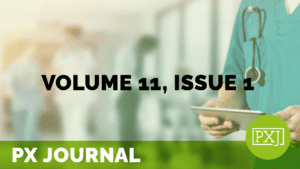Voices of Measurement in Improving Patient Experience

A growing segment of the healthcare industry is now embracing the value of focusing on the patient experience. This movement has caught the attention of and sparked action from executive leaders – those in the C-Suite. The Beryl Institute recently interviewed 17 senior healthcare executives in organizations at varying stages of their patient experience journeys. These leaders represent the roles of Chief Executive Officer, Chief Operating Officer, Chief Nursing Officer, Chief Financial Officer, Chief Medical Officer and Chief Experience Officer. We asked these leaders a series of questions to explore current and evolving perspectives on the patient experience movement: • How does patient experience fit into the strategy of your organization? • Why is patient experience important to your strategy? • What do you see as the role and responsibility of senior leadership in supporting/driving patient experience efforts? • Where have you seen some of your greatest successes/greatest supports of success? • What do you see as the greatest roadblocks to effectively addressing patient experience? • What advice do you have for other healthcare leaders who are working to address patient experience in their organizations? Through the stories and words of its contributors, this paper reveals compelling themes and a clear call to action for healthcare organizations on the importance of focusing on this critical issue. These leaders paint a vivid picture on how we can (and must) collectively engage in improving the patient experience in all healthcare organizations. Contributing organizations include Avatar International, Catalyst Healthcare Research, Gallup, HealthStream, National Research Corporation, Press Ganey and Professional Research Consultants. Through a series of interviews with these leading organizations, the paper examines the purposes for and implications of effective measurement – from methods to key considerations for effective collection, analysis and action. Conversations followed a set of core questions, producing a broad selection of statements, quotes and stories from contributors. The questions included: Why is measurement important in addressing patient experience? What do you see as key measurement practice and what are the best methods for gathering and using data? Where should we be focusing to drive effective measurement in patient experience? What are the best and most effective modes of data collection? How should organizations be using measurement to support their experience efforts and drive their overall strategy? What is the best means to analyze and understand measurement data? What do you see as the impact of HCAHPS/CAHPS surveys and how has this common requirement influenced measurement strategy? What is the impact and potential outcome of effective measurement practice?
Related content
-
 Policy & Measurement
Policy & MeasurementEvaluation of Online Patient Complaints Regarding City Hospitals in Türkiye During the COVID-19 Pandemic: A Content Analysis Study
The COVID-19 pandemic put tremendous pressure on healthcare systems worldwide, which led to heightened scrutiny of the medical services offered by hospitals. This article aims to evaluate complaints about city hospitals in Türkiye during the COVID-19 pandemic using the Healthcare Complaints Analysis Tool, which includes three main domains and seven problem categories. The complaints submitted
Learn more -
 Policy & Measurement
Policy & MeasurementThe initial psychometric evaluation of a new Emergency Department Patient-Reported Experience Measure (ED PREM)
Patient-reported experience measures (PREMs) are critical to evaluating the person-centeredness, safety, and quality of healthcare services internationally. The aim of this study was to describe the initial psychometric evaluation of a new Emergency Department (ED) PREM. Adult patients presenting to the ED of a tertiary hospital in southeast Queensland, Australia during January 2022 were recruited in-person.
Learn more -
 Patient Family & Community Engagement | Policy & Measurement | Staff & Provider Engagement
Patient Family & Community Engagement | Policy & Measurement | Staff & Provider EngagementSignals to Action: Northwestern Medicine’s Journey to Humanizing Healthcare Experiences
In an effort to (re)build trust post-pandemic, many health systems are experiencing the pressure to modernize methods used to engage patients and the workforce who care for them. This trend towards an improvement-focused understanding is reflected in the greater conversations happening across our industry, including the evolved shift in understanding from “Patient” to “Consumer” and
Learn more
